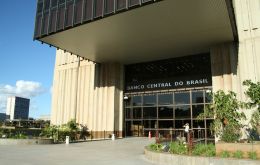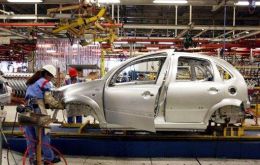MercoPress. South Atlantic News Agency
Tag: Brazilean economy
-
Thursday, May 9th 2019 - 07:29 UTC
Brazilian congress begins to discuss pensions' reform; investors and markets apprehensive

Brazil’s pension reform proposal returns to the congressional spotlight with a committee of lower house lawmakers opening its analysis of the government’s bill just as the outlook for the economy is deteriorating rapidly.
-
Thursday, May 17th 2018 - 08:47 UTC
Brazil leaves basic rate unchanged citing a more volatile world situation

Brazil's central bank unexpectedly left its benchmark interest rate unchanged on Wednesday, citing a more challenging and volatile situation in world economies. The bank left its benchmark Selic rate at an all-time low of 6.5%, after signaling at its previous meeting it would cut at least once more.
-
Tuesday, April 24th 2018 - 08:42 UTC
Brazil poised for historic oil boom

By Mathew Smith<br />
<br />
After being caught up in major corruption scandals and suffering from what some have claimed was its worst economic downturn in 100-years, Brazil has pulled itself back from the brink. The economy commenced growing again in 2017 with gross domestic product (GDP) expanding by 1 percent and 2018 GDP growth forecast by the International Monetary Fund (IMF) to be 2.3%. -
Friday, June 2nd 2017 - 08:15 UTC
Relief for Temer: Brazilian economy grew 1% in first quarter of the year

Brazil's economy grew by one percent in the first quarter of 2017, ending eight consecutive quarters of shrinkage in the country's worst recession in history, the state statistics office said Thursday. While not definitively ending the recession, the spike in growth offers another glimmer of light for Latin America's biggest economy -- and could throw a lifeline to President Michel Temer as he tries to fend off a huge corruption scandal.
-
Friday, April 24th 2015 - 08:43 UTC
Good news for Brazil: economy adds jobs for the first time since November

Brazil's economy added jobs in March for the first time since November, government data showed on Thursday, suggesting the country's likely recession may not be as severe as many economists feared. Factories, farms and services companies in Brazil added a net 19,282 jobs in March, the Labor Ministry said, topping market expectations for 25,000 net firings.
-
Wednesday, March 18th 2015 - 08:28 UTC
Rousseff pledges talks with critics and admits government needs to show humility

Brazilian President Dilma Rousseff pledged to hold talks with her growing number of critics and said her embattled government needed to show humility, after the Sunday massive protests erupted across the country.
-
Saturday, August 2nd 2014 - 08:18 UTC
Rousseff defends industrial policy and economy performance before the sector's lobby

Brazilian President Dilma Rousseff, who hopes to be re-elected for a second term in October’s elections, has defended her government’s industrial policy in front of the sector’s business leaders, the National Confederation of Industry (CNI).
-
Thursday, October 3rd 2013 - 19:23 UTC
Brazil, a giant but with “a lot of fat and much in the way of muscle”

Brazil, Latin America's largest economy is in dire need of structural reforms and reduced government bloat to fuel sustainable growth, analysts say. And this will not happen overnight and will take massive political will. A giant but it carries “a lot of fat and not much in the way of muscle”.
-
Wednesday, September 4th 2013 - 01:31 UTC
Brazilean production in all four industry categories down in July

Brazilian industrial output was down 2% in July from June this year. The information was released this Tuesday in the Monthly Industrial Survey by the Brazilian Institute of Geography and Statistics IBGE.
-
Monday, August 26th 2013 - 02:22 UTC
Brazil's current account deficit doubles in July from a year ago

Brazil's current account deficit more than doubled in July from a year ago, according to the latest Central bank data. The gap reached 9.08 billion dollars in July, while a year ago the deficit was 3.75bn dollars.
